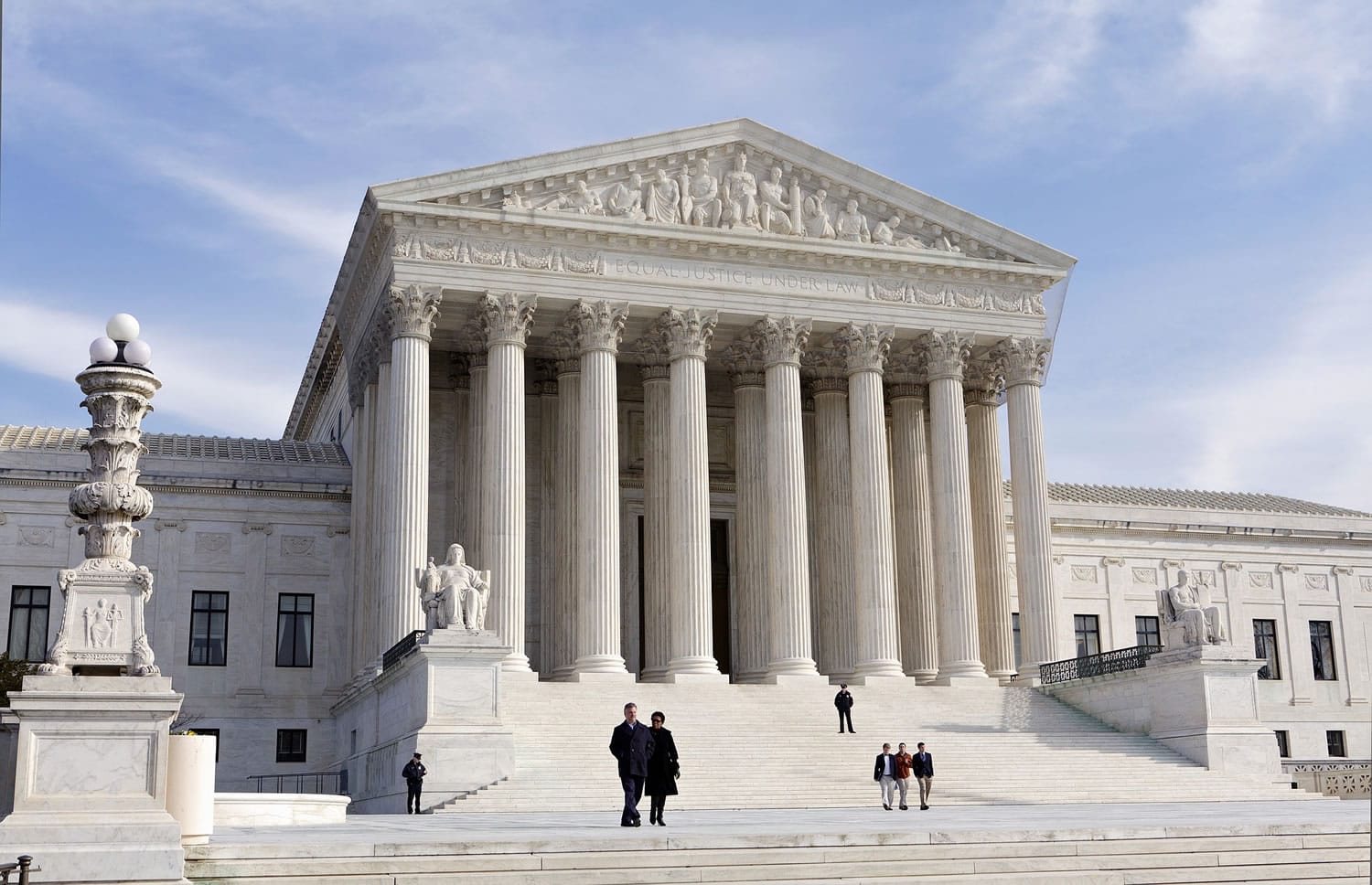WASHINGTON — Twenty-two out of 24. And 206 to 96.
Those numbers tell much about the political impact of a Supreme Court case in which conservatives and Republicans hope to demolish a pillar of President Barack Obama’s health care overhaul. The justices hear arguments next week.
The plaintiffs say subsidies that help millions of Americans afford private insurance are illegal. They say the law limits that aid, paid as tax credits, to people buying coverage from marketplaces established by states, not the federal government.
Democrats disagree. But with a June decision expected, the King v. Burwell case tosses political risks at both parties.
GOP NUMBERS GAME
Only 13 states run their own insurance marketplaces, where people who don’t get coverage through work but earn too much to qualify for Medicaid can purchase policies. The federal government’s HealthCare.gov serves 37 states, which are mostly Republican-run and decided against establishing their own systems.
Of the 11.4 million people who the Health and Human Services Department says have enrolled for coverage for this year, 8.6 million live in states using HealthCare.gov. Some may eventually not receive policies, but many who do stand to lose them if the plaintiffs win because without federal aid, they couldn’t afford coverage.
That pressures Republicans, who uniformly oppose the law, to help the recipients or risk alienating lots of voters.
Here’s why. Of the 24 GOP senators facing re-election in 2016, 22 are from states using the federal marketplace. That includes Sens. Marco Rubio of Florida, a possible presidential candidate, whose state saw a national high 1.6 million enroll for coverage; Richard Burr of North Carolina, where 559,000 signed up; and Patrick Toomey of Pennsylvania, where 472,000 enrolled.
No politician enjoys confronting thousands of constituents who have lost something. Nor do they like facing insurance companies, hospitals and others who would suffer if billions in subsidies for millions of customers vanish.
Perhaps a third of those 22 GOP senators face competitive races next year — enough to put Senate control in play. Republicans have a 54-46 Senate majority, including two Democratic-leaning independents.
In addition, in the 37 federal marketplace states, 206 House members are Republicans and 96 are Democrats, including one GOP vacancy. All House seats are up for re-election next year, though continued GOP control is likely.
GOP RESPONSE
Should the court overturn the subsidies, few Republicans would favor declaring victory and letting millions of people lose federal aid and their health coverage. But so far, Republicans are divided over what to do.
“The response can’t be, ‘Well, some people won’t have insurance,'” said Mike Leavitt, a Republican and health secretary under President George W. Bush.
Leading congressional Republicans say they are readying plans to help subsidy recipients temporarily, perhaps until the GOP can permanently revamp the law. They’ve said little about what benefits they’re considering and how they’d pay for them.
Sen. John Barrasso, R-Wyo., is among top GOP senators crafting a proposal he says would retain some level of subsidies, let people buy narrower policies than the law currently requires and give states more say on health coverage. He sees no broad rewrite of the law soon.
“You really don’t accomplish that until 2017 with a new occupant of the White House,” Barrasso says.
DEMOCRATIC RISKS
If the plaintiffs win, Obama and Democrats will want to keep subsidies flowing and protect the law that they enacted unilaterally in 2010. While many Republicans seem willing to help those beneficiaries temporarily, it’s unclear what trade-offs they would seek.
The GOP might demand changes like those Barrasso is considering or others like increasing the size of businesses that must offer health coverage. Negotiations could draw in other issues like the impending expiration of health services for children from lower-income families.
Should Obama refuse such demands as undermining his health care overhaul, he risks looking unreasonable in the shadow of a Supreme Court finding that his administration was implementing the law too aggressively.
“I’d sure hope the president was interested in helping those people who have been harmed by his illegal action,” Barrasso says.
Congressional Democrats might split, with liberals demanding no concessions but moderates like Sen. Heidi Heitkamp, D-N.D., open to some health law changes. Only three Senate Democrats from states using HealthCare.gov face 2016 re-election, including Minority Leader Harry Reid of Nevada, where 72,000 people enrolled for coverage.
Looking to keep pressure on Congress, Health and Human Services Secretary Sylvia Burwell told lawmakers this week that the administration lacks authority to fix the “massive damage” that would occur if the plaintiffs win.
IF DEMOCRATS WIN, NO EASY PATH
If the court dismisses the challenge, Democrats will have little incentive to revamp the law. But they will face another campaign season of defending a law that still lacks majority public support.
Another complication: The ever-unpopular IRS’ role in the health care law. It distributes health insurance subsidies to people in the form of tax credits.
But it also fines people, by raising their tax liability, if they flout the law’s requirement that they purchase coverage. Coupled with last week’s disclosure that the government sent inaccurate tax information to 800,000 HealthCare.gov customers, the agency reinforces some people’s distaste for the law.



